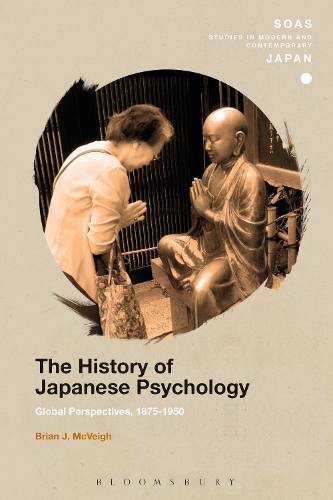
The History of Japanese Psychology: Global Perspectives, 1875-1950
(Paperback)
Available Formats
Publishing Details
The History of Japanese Psychology: Global Perspectives, 1875-1950
By (Author) Dr. Brian J. McVeigh
Bloomsbury Publishing PLC
Bloomsbury Academic
28th June 2018
United Kingdom
Classifications
Tertiary Education
Non Fiction
Psychology
History of ideas
Social and cultural history
Asian history
150.952
Physical Properties
Paperback
336
Width 156mm, Height 234mm
531g
Description
Through a focus on the contributions of pioneers such as Motora Yujiro (18581912) and Matsumoto Matataro (18651943), this book explores the origins of Japanese psychology, charting cross-cultural connections, commonalities, and the transition from religiousmoralistic to secularscientific definitions of human nature. Emerging at the intersection of philosophy, pedagogy, physiology, and physics, psychology in the late 19th and early 20th centuries confronted the pressures of industrialization and became allied with attempts to integrate individual subjectivities into larger institutions and organizations. Such social management was accomplished through Japans establishment of a schooling system that incorporated psychological research, making educational practices both products of and the driving force behind changing notions of selfhood. In response to new forms of labor and loyalty, applied psychology led to or became implicated in personality tests, personnel selection, therapy, counseling, military science, colonial policies, and national spirit. The birth of Japanese psychology, however, was more than a mere adaptation to the challenges of modernity: it heralded a transformation of the very mental processes it claimed to be exploring. With detailed appendices, tables and charts to provide readers with a meticulous and thorough exploration of the subject and adopting a truly comparative perspective, The History of Japanese Psychology is a unique study that will be valuable to students and scholars of Japanese intellectual history and the history of psychology.
Reviews
The History of Japanese Psychology is a landmark piece that will come in handy for a reader interested in the history of psychology, Japanese psychology, or Buddhist philosophy, or anyone interested in this specific slice of evolution of social science in comparison with Western psychology. * H-Japan *
Provides a present-centered, Westernized view of psychology in Japan, and a source collection which privileges those "national heroes" who fit a positivist conception of engaging with the "psychological." * Journal of the International Research Center for Japanese Studies *
McVeighs History of Japanese Psychology is nothing short of a landmark achievement in the history of psychology. He is both detailed and comprehensive in providing a rich understanding the historical, cultural, and social forces that colluded to bring about the interiorization of the person, and thus the emergence of a modern Psychology in Japan. Spanning over 1,000 years of history, he illustrates not only an evolution of concepts dealing with subjectivity, but how the consumer of psychological knowledge, on a more practical level, is also affected. * Scott Greer, University of Prince Edward Island, USA *
Author Bio
Brian J. McVeigh received his PhD in anthropology from Princeton University, USA and is now training in mental health counseling at the University at Albany, SUNY, USA. The author of twelve books, his latest publications include Nationalisms of Japan: Managing and Mystifying Identity (2003), Interpreting Japan: Approaches and Applications for the Classroom (2014), and How Religion Evolved: Explaining the Living Dead, Talking Idols, and Mesmerizing Monuments (2016).
